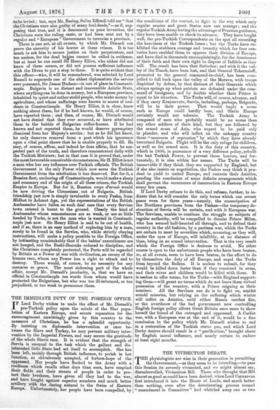THE IMMEDIATE DUTY OF THE FOREIGN OFFICE.
PLord Derby wishes to undo the effect of Mr. Disraeli's pro-Turkish policy upon the minds of the Slav popu- lation of Eastern Europe, and secure reparation for the encouragement unwittingly given by this country to the massacre of Christians, he has a splendid opportunity. By insisting on diplomatic intervention at once be- tween the Slays and Turkey, he may prevent military inter- vention by the Imperial Powers, and may secure the gratitude of the whole Slavic race. It is evident that the strength of Servia is unequal to the task which the gallant and dis- interested little State had set itself to accomplish. She has been left, mainly through British influence, to perish in her function, so chivalrously accepted, of forlorn-hope of the oppressed. Her people have flocked to the Army with a readiness which recalls other days than ours, have emptied their fields and their streets of people in order to pro- tect their brethren, have given all they had to the war, and have fought against superior numbers and much better artillery with the daring natural to the Swiss of Eastern Europe. Unfortunately, her people have been compelled, by to be levied ; but, says Mr. Baring, Salim Effendi told me " that the conditions of the contest, to fight in the way which only regular armies and great States now can manage ; and the regular Turkish Army having the advantage of Prussian guidance, they have been unable to check its advance. They have fought well, the pro-Turkish Correspondents on the spot all recording the heaviness of the Turkish losses ; but the Turks have ex- hibited the stubborn courage and tenacity which for four cen- turies have enabled them to oppress their division of Europe, and have died in thousands uncomplainingly, for the dominance of their faith and their own right to dispose of Infidels as they will. The result has been that Saitschar, and with it the val- ley of the Timok, have been lost, and that General Tchemaieff, promoted to the general command-in-chief, has been com- pelled to fall back upon the valley of the Morava, with troops dispirited by defeat, by that distrust of their Generals which always springs up when patriots are defeated under the com- mand of foreigners, and by doubts whether their Prince is equal to his situation. The Turks will, of course, advance, and if they carry Krajosevatz, Servia, including, perhaps, Belgrade, will be in their power. That would imply a scene such as Europe could hardly bear, and Slavic Europe certainly would not tolerate. The Turkish Army is composed of men who probably would be no worse than any other soldiers of their kind, but they are followed by the armed scum of Asia, who expect to be paid only in plunder, and who will inflict on the unhappy country those "measures of repression" by which they have already terrorised Bulgaria. Flight will be the only refuge for children, as well as for armed men. It is the duty of this country, which in 1856, in pursuance of a very different policy, rebuilt the bad Turkish Power, to prevent these horrors, and for- tunately, it is also within her means. The Turks will be immovable if they think they are supported by England, but if she also insists on negotiation, the Pashas may think it pru- dent to yield to united Europe, and restrain their Asiatics, pending the conclusion of some definite arrangements which shall prevent the occurrence of insurrection in Eastern Europe every few years.
If Lord Derby refuses to do this, and refuses, further, to in- dicate that he will consider the only terms which can secure peace even for three years—namely, the emancipation of the Northern provinces from the Pashas—the temporary de- struction of Beryl& will be certain, and with it European war. The Servians, unable to continue the struggle as subjects of regular authority, will be compelled to dismiss Prince Milan, who has seemed half-hearted all through, and to defend their country in the old fashion, by a partisan war, which the Turks are certain to meet by severities which, occurring, as they will, under the eyes of Europe, will infallibly, at no distance of time, bring on an armed intervention. That is the very result which the Foreign Office is desirous to avoid. No other course is open to the unfortunate people who have been beaten, or, at all events, seem to have been beaten, in the effort to do by themselves the duty of all Europe, and expel the Turks from beyond the Balkan. It is useless to submit, for they would be killed down faster than if they remained in arms, and their wives and children would be killed with them. It is useless to offer terms, for the Turks—with England support- ing them—will grant no terms which do not leave them virtual possession of the country, with a Prince reigning as their nominee. All the Servians can do is to fight on, amidst untold miseries, but relying on the suffering which winter will inflict on Asiatics, until either Russia catches fire, or the overthrow of the bad government now controlling English foreign policy allows Great Britain once more to show herself the friend of the outraged and oppressed. A Carlist war, with a European war at the end of it, would be a fine conclusion to the policy which Mr. Disraeli wishes to end in a restoration of the Turkish status quo, and which Lord Derby desires should result in a "pacification," brought about by English moral influence, and nearly certain to endure at least eight months.






























 Previous page
Previous page